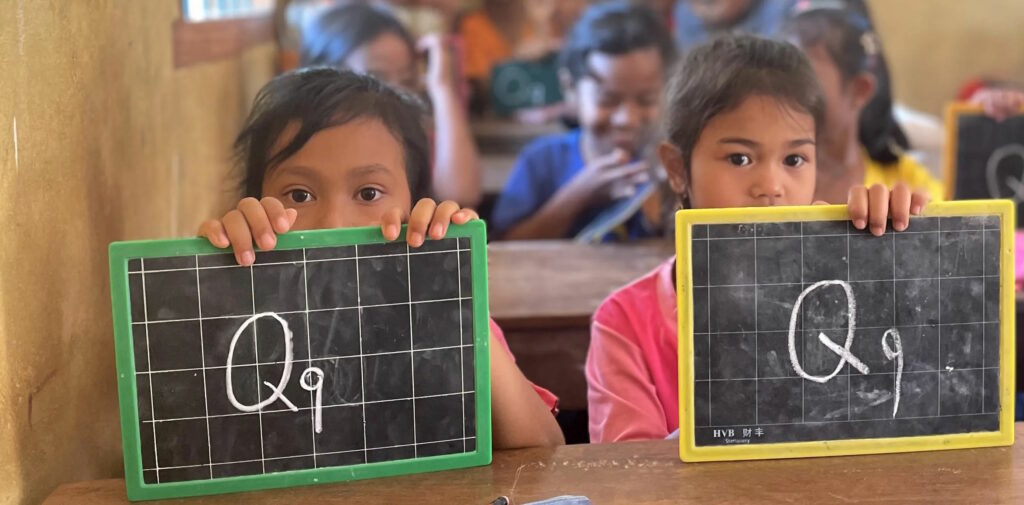Many of you have asked me about my motivation to teach English as a volunteer here in Asia.

If this picture doesn’t answer the question for you, I have actually chosen volunteering as the subject for my final essay in my TEFL exam.
Here you go:
What are benefits or drawbacks of voluntary teaching for the students
I started teaching as a volunteer here in Southeast Asia about one year ago. For me, as for many other volunteers, this is a unique opportunity to properly get to know a culture, instead of only scratching its surface as a casual tourist. You get in touch with so wonderful people and the time you spend with these curious and energetic children is simply amazing. In addition you are even doing good in helping the children with their education. I can only recommend everybody to do something like this at least once in a lifetime.
But let’s look at the influence volunteer teaching has on the students. What advantages, and disadvantages are there?
Many of the schools asking for volunteers to help them teaching are non-governmental organizations, schools located in very rural areas where children have no other chance of learning English. The local teachers they find to teach there for very low salary, are often poor at English themselves. So the biggest advantage of volunteers teaching, is without a doubt that they carry English to these areas and these children. Getting to hear English speakers speak English is extremely helpful to develop a proper English. Then there is also the diversity in volunteers, the children get to hear some American English this week Australian English next week, some British English the next month and then maybe some English with a French accent another time. This is a big advantage on one hand for sure. On the other hand, it might also cause misunderstanding sometimes.
Another big advantage I see is the motivation the children get by volunteer teachers. Seeing the foreign teachers motivates them on different levels. I think they simply enjoy communicating with them, and they also directly see what they are learning English for. Also, every volunteer brings their own teaching style or way of teaching, that they know from their home country, so lessons don’t become boring for the children. And lastly, volunteers are most of the time very motivated themselves over the short time span they spend teaching.
This short period of time teachers can spend with the children can at the same time be seen as one of the disadvantages as well. A usual volunteer can stay with the school for one or two weeks, sometimes for a months, but then they have to go back to work. So as soon as they have established a connection with the children, or the children have actually established a connection with their teacher, the teacher leaves again. Also it is very hard to follow a continuous syllabus like that. The students can usually not afford any course books which would indeed help with that issue, by defining the syllabus. Luckily, some of the schools get donated these course books.
A point we have already touched is, that it can get confusing when you are taught American English in one month and British English the next. In general, I think, although change is a very good thing, especially for children, a certain continuity throughout the course would also be helpful and you cannot have that with changing volunteers.
The biggest disadvantage in my opinion is, that volunteers are rarely educated teachers, so they don’t know how to plan a lesson, how to deal with problems or how to effectively teach grammar, for example. This is the reason why I decided to take this TEFL course and I’m very grateful that you have given me this opportunity to become an even better help for these kids.
There is also one specialty with beginner classes where it can be quite a big disadvantage if you don’t speak the students mother tongue and don’t have a chance of explaining them anything.
Overall, I believe the advantages outweigh the disadvantages by far. Even though volunteers rarely bring a sophisticated teaching style and cannot offer continuity, they do introduce different ways of teaching, and children get to hear authentic English pronunciation. Motivation is kept high when learning from foreigners, and the children actually get used to communicating with foreigners. Additionally it is simply a great experience; for the volunteers, for the students, for the locals in that community and for the school.
As a remark, I must add that all this is based on my personal experience, and it’s my personal thoughts. If you would conduct a proper research on this topic, you might encounter totally different facts and figures. And there must also be voluntary teaching in totally different contexts.



Leave a Reply